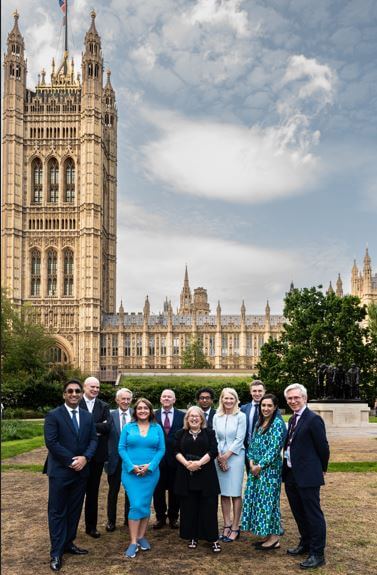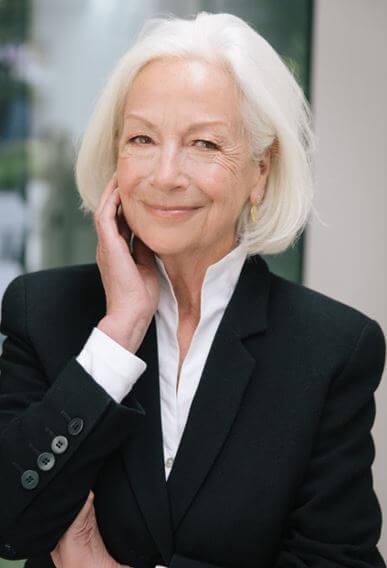House of Lords celebration for Peace Studies

THE UK’s first ever Peace Studies school celebrated its 50th anniversary on Thursday, May 18th, with a reception at the House of Lords.
The school was established in 1973 at the University of Bradford, and is known worldwide for its research and for influencing positive societal change. Sixty invited guests gathered in The Attlee Room, including peers, members of parliament, academics, alumni, notable peacebuilders and members of the Quaker community, whose fundraising enabled the founding of Peace Studies at Bradford.
Vice-Chancellor of the University of Bradford, Professor Shirley Congdon, said: "We are immensely proud of Peace Studies. It was founded not by the University alone, but in collaboration with a group of Quakers, who shared the same vision, and supported by inspirational leaders, politicians and creatives.
"From a small, yet fearless start, it has grown to be recognised, internationally, as a leading centre in the study of peace, conflict and sustainability. Our academics have lent their expertise to organisations including the UK Government, the UN, World Health Organisation, the EU and NATO, and worked alongside peacekeepers in conflicts including Israel-Palestine, the Balkan Wars and the Iraq War. Our graduates have gone on to work in international peacekeeping, humanitarian and development organisations.
"The Centre is as relevant and needed today as ever, perhaps more so. Conflicts continue to rage throughout the world while the global fight against climate change has never been more urgent."

After the event, Professor PB Anand, Head of Department of Peace Studies and International Development (PSID), and Professor Amir Sharif, Dean of the Faculty of Management, Law and Social Sciences, under which PSID sits, spoke of the important work the department will continue to do in the future concerning policy and gender equality.
Professor Amir Sharif, Dean of the Faculty of Management, Law and Social Sciences, said: “Through Peace Studies, we have been shaping the changemakers of the future for the last 50 years. As we look forward to the next 50 years, on a day in which we celebrated at the heart of Government, we look to our policymakers to be the changemakers we need them to be and we look forward to seeking opportunities to impact policy in years to come."
Professor PB Anand, Head of Department for Peace Studies and International Development at the University of Bradford, said: “At the heart of the University’s mission is inclusion and social mobility. Our department will remain an example of that, in particular in breaking down barriers and especially in enabling women to emerge into leadership positions.
“Recently, I met a student who had researched how many peacemakers in the world are women and she found women made up only seven per cent. That needs to change and we hope the work we do in the department will contribute to that.”
Guest speakers
Three times Nobel Peace Prize nominee and University of Bradford alumni Dr Scilla Elworthy, former Professor of International Politics at the University of Bradford, Malcolm Chalmers, now Deputy-Director of the Royal United Services Industry (RUSI) and life peer Lord Bhikhu Parek spoke at the event.
Dr Elworthy, whose research into nuclear weapons decision-making through her Oxford Research Group earned international recognition, spoke about how she has been inspired throughout her career by Peace Studies inaugural Chair, Professor Adam Curle.
She said ahead of the reception: “Adam Curle was an iconic figure to me. His work framed a lot of my thinking in terms of the thoughtfulness, mindfulness and Buddhism of my work.”

As one of only a few women working in the field during the 1980s, Dr Elworthy revealed it was only after gaining her doctorate in 1993 that she felt she was treated with the same respect as her male peers. She said: “Many of the people I wanted to interview in the nuclear weapons decision-making programme refused to speak to me. There was much discrimination in what was a particularly hard-nosed field.
“I was often the only woman in meetings of 200-plus Ministry of Defence and military officers making massive decisions on British nuclear weapons. I had to stand up and put very controversial questions to them and I was always referred to as ‘Miss’ or ‘Madam.’
“I remember very clearly one occasion asking a very challenging question and the chairman told me, ‘Sit down, madam!’ I didn’t, but it did make me think, ‘I’m not having this anymore, I’ve got to be a ‘doctor.’ I was treated completely differently after I got my doctorate from Bradford.”
'An asset to the country'
Professor Malcolm Chalmers, a former Special Advisor to Foreign Secretaries Jack Straw and Margaret Beckett, spoke of his fond memories at the University, “putting the world to rights for hours on end” in the canteen with the department’s second head of department, Professor James O’Connell, Professor Owen Greene and Professor Paul Rogers, a leading voice on international conflict and peacemaking.
Afterwards he summed up the importance of the department, saying: “If we didn’t have Peace Studies, you would have to invent it. It fulfils a really key function of combining that larger vision for a peaceful world with the practical and what can be done to achieve that.”
Lord Bhikhu Parek, a British political theorist, academic and life peer, spoke about the biggest hurdle the department faced, when it was investigated in the early 1980s by the Department of Education, at the behest of Prime Minister Margaret Thatcher.
“Despite her attempts, the department continued,” he said. “That, I think, is a tribute to the department, that it continued despite the opposition of no less a person than the Prime Minister.
Praising the department, he said: “It has produced some wonderful academic work and has proved a great asset not only to the University but to the country.”
Guests:
Oliver Robertson, Head of Witness and Worship, Quakers in Britain: “When Quakers worked to set up the University of Bradford Peace Studies department in 1973, it was an act of faith and it has been inspiring to see how that trust has blossomed. Hearing about all the issues and people that have been shaped by Peace Studies is a reminder both of what can be achieved and how necessary this work still is in the world today.”
Allan Jagger, former President of Rotary International Great Britain and Ireland and recipient of an Honorary Degree of Doctor of the University of Bradford: “It’s wonderful to see the effect we have on the community by doing the things we do at the University. We should be proud as a nation that we have an organisation in Bradford that’s the number one in the world. We have 600 applicants for 10 scholarships on the 15-month Master’s programme at the University’s Rotary Peace Centre and the number one choice is always Bradford.”
Former Bradford City footballer, now co-founder and CEO of One in a Million, Wayne Jacobs: “To hear about the birth of Peace Studies and all its activity and to see where it is now is inspirational. It’s no surprise it has been so successful because it has heart behind it.”
The Very Reverend Andy Bowerman, who was installed as Dean of Bradford last year: “I’ve got a lot of history of working in peace and international development so coming back to Bradford it’s really exciting to see how Peace Studies and International Development has grown and flourished. Today was a real celebration of something that started as a slightly unconventional idea 50 years ago and has become mainstream and at the very forefront of the field.”
Professor Peter Mitchell, Head of School for Social Sciences, University of Bradford: “The breadth of knowledge and expertise in the department of Peace Studies and International Development is something absolutely central to its success. Through that, the department has created a fantastic legacy of alumni with all sorts of different interests around the world, who have helped make a difference. The world would have been a much poorer place without Peace Studies.”
Peace Studies history:
Peace Studies was launched in 1973 at the University of Bradford. It was partly funded by a public appeal, organised by a group of northern Quakers who raised £75,000 in just 10 weeks, securing donations from the likes of Prime Minister Harold Wilson, Chancellor of the University of Bradford from 1966 to 1985, writer J.B.Priestley and cultural figures including British composer Benjamin Britten.
The University matched the amount of funding and Peace Studies was established and it continues to be supported by the Quaker Peace Studies Trust.
Today, there are 75 students on the BA International Relations, Politics and Security Studies and more than 600 across eight Master's programmes, as well as PhD students.
In 2002, Bradford became a founding member of the Rotary Peace Centres network. As one of seven Rotary Peace Centres across the globe - and the only one in the UK - the University hosts 10 fully-funded MA Rotary Peace Fellows from all over the world every year
Read the full history of the department and watch a specially commissioned video for the 50th anniversary here.
